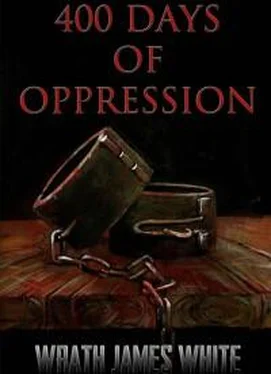My mouth was hanging open. I had never heard of any of this. If all this were true, then what happened? When did it all go wrong? America seemed to have gotten it right. They had done everything to make sure blacks would get equal rights, a good education, freedom from discrimination. What happened?
Kenyatta continued to read. I hung on every word, not feeling the same dread I normally felt when Kenyatta read from the book. What I felt was excitement, curiosity, and more than a little confusion. How come I didn’t know all of this?
“The lives of former slaves improved tremendously during Reconstruction. Many African Americans were overwhelmed with their new rights. They were now full citizens. They could vote, go to school, work for an honest wage, and even run for public office. Hiram Revels was the first African American to be elected to the Senate in Mississippi. African Americans were elected to public office in cities all over the country. There were black sheriffs, black mayors, and a black superintendent of education.”
Kenyatta abruptly closed the book, picked up his fork, and resumed his meal, leaving me hanging.
“But what happened? That can’t be it! What about Jim Crow?”
Kenyatta smiled, put down his fork, wiped his mouth with his napkin and took my hand again. He looked at me with eyes full of warmth, patience, and understanding. My soul fell into those eyes.
“Let’s not ruin the day. There’s plenty of time for all of that.”
And that’s when I knew my education in the black experience in America was not over. This was only a reprieve, the way the 14 thand 15 thAmendments had been a brief reprieve in the history of black Americans. I tried to enjoy the rest of my meal, but I couldn’t. My mind kept drifting back to the book, wondering how Jim Crow laws factored in to what Kenyatta had just read to me and how they were going to factor into our lives in, what I was sure would be, the very near future.
There were exactly three days of normalcy and bliss. We went shopping together as a couple. Went to eat at an expensive French restaurant downtown. We even got dressed up one night and went to see the San Francisco Ballet do a performance of Bram Stoker’s Dracula . And, of course, we made love. We made love every day, two or three times a day.
The last day of my reprieve, I was awakened by Kenyatta’s tongue against my clitoris and his powerful hands cupping my ass-cheeks like he was holding a large bowl and drinking from it like a savage, greedily lapping up its contents. Judging from his enthusiasm, the bowl formed by his hands contained something singularly sweet and intoxicating. That this “something” was me, made me feel all the more special, loved, desired. His tongue swirled, flicked, and stabbed at my clitoris. I moaned until that was no longer enough to express the ecstasy I felt and then I screamed, exhaling my soul into the ether and inhaling it with the next breath as the little death overcame me. I had my first orgasm of the day mere moments after waking. Then Kenyatta fucked me.
He climbed on top of me and eased himself inside me. I was still tight after so long without him, and it hurt like I haven’t hurt since I was a virgin. But Kenyatta was uncharacteristically gentle...at first.
He whispered in my ear as he parted my labia with the head of his cock. I winced and whimpered.
“I love you, Kitten. It’s so good to have you back home. I missed your pretty smile. I missed your laugh. And I missed this wonderful pussy.”
My entire body quivered at the sound of his voice, a Pavlovian response that resonated to the core of me. Every compliment was like sustenance to the famished, libations to the weary and dehydrated. I gobbled them up, enjoying his words as much as his cock.
Kenyatta’s saliva and my own orgasm had left me slippery wet and he slid the rest of his length easily inside of me. The pain took my breath away before giving way to lubricious waves of pleasure as Kenyatta began to slowly grind and thrust, moving his hips in slow semi-circles as his cock seemed to touch my spine. He grabbed my full hips, using them for leverage, pulling me off the mattress to meet each thrust as his lovemaking became less gentle.
He tossed both of my legs over his shoulders, maintaining eye contact as he pounded himself inside of me, brutalizing my pussy. I pinched his nipples, trying to make him cum before he broke me, but finding my own flesh responding to his rough lovemaking with shocks of pleasure. An unexpected orgasm took hold of me as Kenyatta whipped his head back and roared. His body tensed as he shot his seed deep inside me. My vagina felt bruised and swollen. My clitoris felt like it had been used as a speed bag, nevertheless, I came hard. My body bucked and convulsed with the force of the sudden climax. Kenyatta was still staring into my eyes, watching me cum. When I lay still, spent and exhausted, he smiled at me.
“I love you, Kitten.”
“I love you too, Kenyatta.”
That day we went window shopping at a jewelry store. We picked out a wedding ring to match the engagement ring that was still in Kenyatta’s possession. We went to a bridal shop and I tried on gowns. I was beaming while the sales women buzzed around me, telling me how lovely I looked in this dress or that dress and what a lovely couple we made. I could not have imagined a more perfect day. Everything I had gone through the last 300 days seemed like a memory. Then we went home and reality put its foot firmly in my naive ass.
We had just walked in when I noticed my bags were packed and sitting by the door. The next thing I noticed was Angela reclining on the couch with an Indian woman in a beautiful red and gold saree whom I’d never seen before. I assumed the woman was Angela’s new girlfriend. But that didn’t explain why all of my shit was packed.
“Hi, Angela. What’s going on?” I turned to Kenyatta and gestured toward my packed bags. “What’s going on?”
This time, when Kenyatta opened the book, I knew I wouldn’t like what he was about to read me.
“Only ten years after the 14 thand 15 thAmendments were passed, granting freed slaves full citizenship and equal rights, federal troops withdrew from the South, returning it to local white rule. The Republican Party, then the champion of Reconstruction and Freedmen’s rights, had lost their hold on the reins of national power. From the late 1870s, Southern state legislatures, no longer controlled by carpetbaggers and freedmen, passed laws requiring the separation of whites from “persons of color” in public transportation and schools. Anyone strongly suspected of black ancestry was for this purpose a “person of color.” Parks, cemeteries, theaters, and restaurants were segregated to prevent any contact between blacks and whites as societal equals. In 1890, despite 16 black members holding office at that time and voting on the issue, the Louisiana General Assembly passed a law to prevent black and white people from riding together on railroads. A case challenging the law, Plessy v. Ferguson, reached the U.S. Supreme Court in 1896. The law, along with similar laws on the state and local level, was codified by the Supreme Court ruling that public facilities for blacks and whites could be “separate but equal.” The immediate effect of the ruling was that, throughout the South, they had to be separate. Southern states began to limit voting rights to those who owned property or could read well, to those whose grandfathers had been able to vote, to those with “good characters,” to those who paid poll taxes, or could pass any number of tests not required of white voters. In 1896, Louisiana had 130,334 registered black voters. Eight years later, only 1,342—1 percent—could pass the state’s new rules.
Читать дальше










